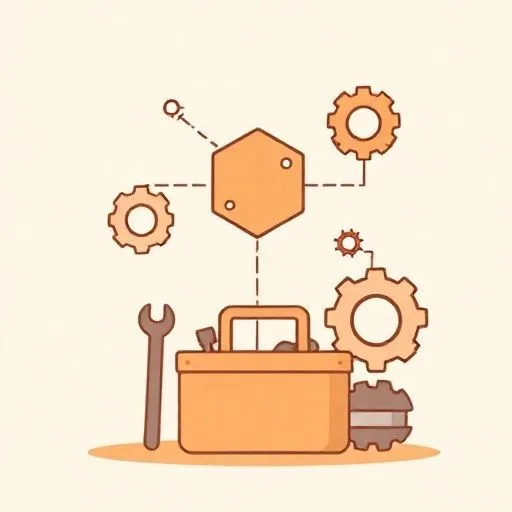
The job landscape in 2025 differs from even expert predictions. Recent data shows the U.S. jobs market is nearly a million positions weaker than expected. Major tech companies like Microsoft and Google have made workforce adjustments, while AI integration transforms operations. But here’s the hopeful truth: for every door that closes, new ones open—if you know where to look. It’s not just about weathering job storms—it’s about charting your own path and coming out stronger!
Just last weekend, my daughter and I sketched our family ‘career map’ over kimchi pancakes—fun, messy, and full of hope!
How is the Job Market Changing in 2025?

The World Economic Forum’s Future of Jobs Report 2025 brings both challenge and opportunity: 22% of today’s jobs will be transformed by 2030, with 170 million new positions emerging worldwide. Yes, you read that correctly—not just jobs disappearing, but jobs being created simultaneously. The professional journey today has less to do with finding a stable harbor and more about becoming a skilled navigator of changing waters.
Think of it like updating maps for a journey—sometimes the route changes, but with the right tools and mindset, you’ll still reach your destination. Those who embrace this reality rather than resist it find themselves ahead of the curve, confidently steering their professional ship through choppy waters.
Before diving into skill lists, let’s pause and think about how adaptability shows up in our everyday lives.
How Can Future-Proof Your Skills Against AI Changes?

Let’s talk about something incredibly valuable: your skills. Future-proofing your capabilities is increasingly important in today’s job market uncertainty. The research indicates that by 2030, nearly 40% of our current skill sets will become outdated or transformed. Sounds intimidating? Not when you flip the perspective.
This means approximately 60% remain relevant—and you’ll have the opportunity to develop new capabilities that position you for growth. The key lies in recognizing which skills are becoming future-ready. According to industry experts, AI literacy, data analysis, critical thinking, and project management are emerging as the cornerstone capabilities. Think of these not as just technical skills, but as future-proof superpowers that can be applied across various roles and industries.
The advantage? Many of these capabilities can be developed through targeted learning while you’re still employed, making your transition smoother when changes come—because they will.
What Career Cushion Strategies Provide Security During Layoffs?

Many savvy professionals are wisely developing what we might call “career cushioning”—creating alternative paths to ensure stability during job market uncertainty. This career resilience strategy is about preparing when everything seems stable. Why wait until change knocks on your door to prepare?
Building a side hustle or freelance business doesn’t mean doubting your current role; it’s about securing your professional future. What’s interesting is how many view this not just as financial safety net, but as career insurance that actually expands their skills and connections.
Think of it like having multiple income streams diversifying your financial portfolio—except in this case, you’re diversifying your professional value proposition. The reality? Those who have alternative lanes when one road closes often find themselves moving forward faster than expected.
How Does Building Visibility Help During Job Market Uncertainty?

When organizational changes occur, who tends to weather the storm in our uncertain job market? Those who’ve built visibility as value-creators within their teams and organizations. I’m not talking about self-promotion—rather, genuine contributions that others recognize.
This might mean volunteering for cross-functional projects, mentoring colleagues, or consistently solving problems rather than raising concerns. These actions make your contributions visible in quantifiable ways. Simple habits like presenting thoughtful ideas during meetings, keeping projects ahead of schedule, or supporting teammates during crunch times all build your professional brand.
Remember this: when decisions are being made, decision-makers tend to remember those who bring solutions—not just problems, especially during widespread layoffs or restructuring. What if you started tomorrow identifying just one opportunity to demonstrate your unique value?
Can Career Uncertainty Actually Create New Opportunities?

Let me share a mindset shift that can transform how you approach professional uncertainty in our rapidly changing job market: view challenges not as setbacks but as opportunities to reinvent.
One afternoon, my now 7-year-old pointed out how she turns mistakes into art—what if we treated career setbacks the same way?
Career expert Alari Aho suggests layoffs and transitions can actually be “rebranding moments” that propel us forward. When we reduce attachment to any single career path, we open ourselves to more possibilities and build career resilience.
Many professionals who’ve faced unexpected career turns report finding greater fulfillment in new directions they might never have explored otherwise. The question isn’t whether change will come—how will you respond when it does? The most resilient professionals aren’t those who avoid change, but those who adapt and grow through it, emerging stronger and more purposeful in their future-proof careers.
Source: 13 Ways To Future-Proof Your Career From Layoffs In 2025, Forbes, 2025/09/10
